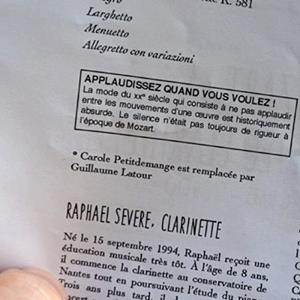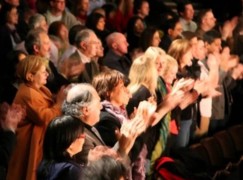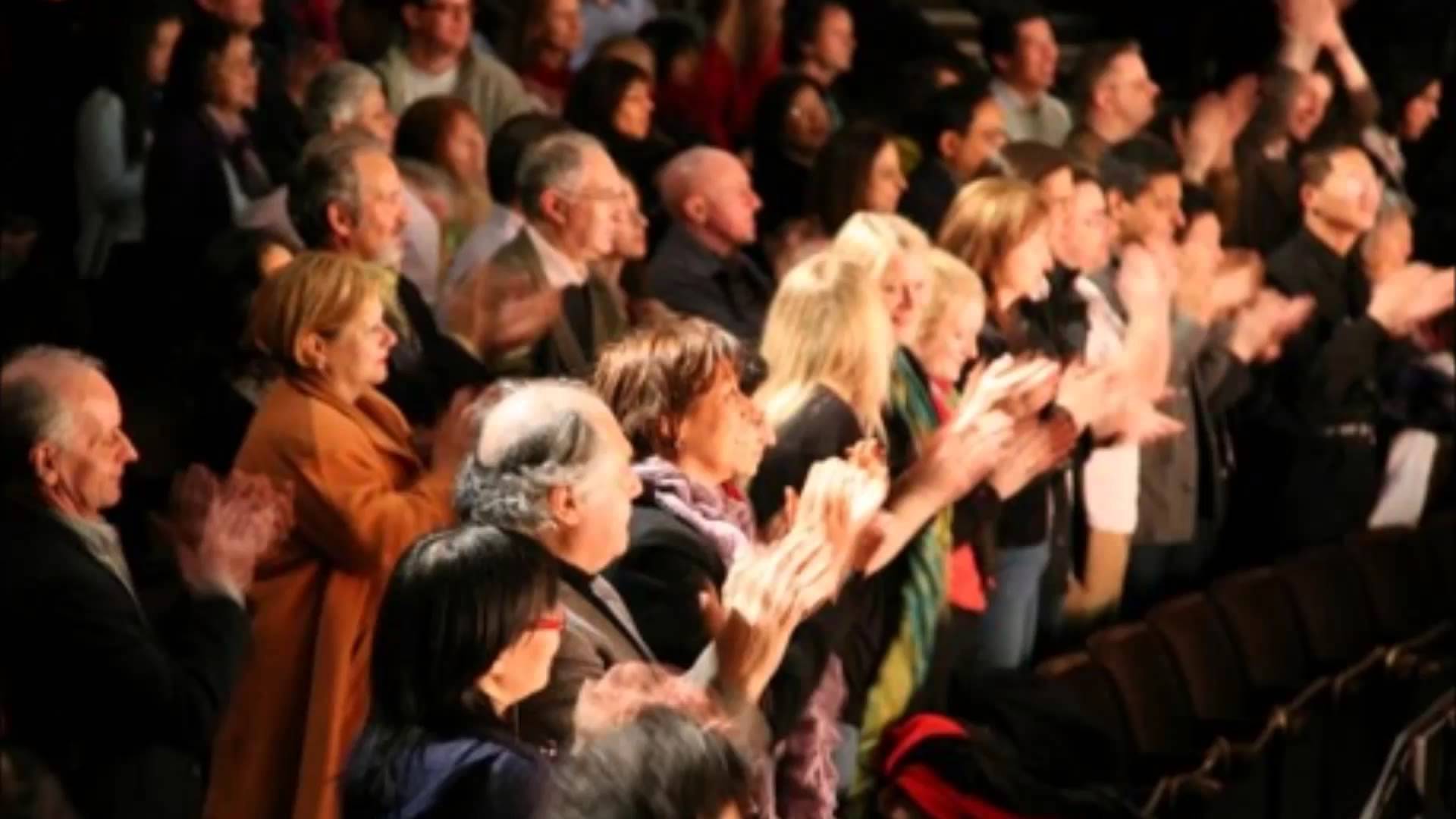Paris concert hall: Not applauding between movements is historically absurd
mainThe Finnish music blogger Janne Koskinen has spotted an interesting innovation at the Centre de Musique de chambre de Paris. A notice in the programme states:

Applaud when you like
The 20th century fashion of not applauding between movements is historically absurd. Mozart never imposed silence.

Janne tells us that, on Friday night, there was applause between every movement of Mozart’s Clarinet Quintet and Schumann’s Piano Trio No 1.






I detest the ignorance of people who applaud between movements. A 3 or 4 movement work is a total statement and should be heard in its entirety before we respond.
I find it curious that you use the word ‘ignorance’. that strongly suggests that what they’re doing is…wrong. I wouldn’t ever accuse someone who had a different opinion to me as being ignorant…
. A certain composer once wrote ecstatically to his father that a phrase in one of his symphonies excited the audience so much that they applauded during the movement. The composer was Mozart, a noted ignoramus…
Herr Mozart was a great ignoratus, he had no idea about HIP.
It is a bit ironic to read you moaning about “ignorance” when you read the program note above. Given that people would chat throughout Händel operas and Haydn symphonies, it is a bit rich to talk of the holiness of the oeuvre, right?
Of course, things may be different for a Mahler symphony. But still, up to Beethoven/late Mozart, in most symphonies, the movements are interchangeable between works…
Considering that the movements of many of not most Haydn symphonies/quartets going back before Mozart are demonstrably motivically and intervallically related, I think he’d be surprised to read that they are “interchangeable.”
Also the ignorant people who want to decide for you when
you should applaud , I knew an ignorant one who thought it was
the 2nd. and 3rd . movements , now we learn it is the 3rd&4th .
Soon it will be no applause…..
Sometimes it is a complete statement, sometimes it is not… Such rigidity doesn’t seem to make much sense in today’s musical world!
I imagine one Beethoven perform selected movements from various works at his concerts he expected and even hoped that people would applaud at the end of each. I don’t believe Beethoven was an ignorant fool…
I think that applauding between movements is quite acceptable if it comes spontaneously after an outstanding performance. Beware the risk of it becoming a new rule. For me what is really disturbing is when the public starts applauding too early. The public should remain quite silent and refrain from applause by at least 3 to 4 seconds or, even better, until the soloist (or the conductor) shows with his or her body attitude that the piece is concluded. The reader surely knows many examples of unique, exceptional live performances preserved in tape that were spoiled at the conclusion by too early applause.
“Beware the risk of it becoming a new rule.”
I agree with the entirety of your comment, unrealistic as it is to expect an audience to refrain from applauding until the soloist or conductor signals that the performance is ended.
I wonder whether intra-work applause could become the new standing ovation. In Detroit and Ann Arbor, every performance receives a standing ovation. It seems as if the message conveyed by the audience’s decision to stand has transformed from “We appreciate the exceptional performance” to “We appreciate your performing here.”
“We appreciate your performing here.”
I think Tony explains it perfectly.
In the States, at least, audiences in places like Ann Arbor and Chapel Hill and Durham and Charlottesville and Davis (smallish university towns), and even mid-sized cities like Milwaukee and Kansas City and Detroit (not the large and wealthy city it was once), know very well that they’re off the beaten track. So they feel themselves very fortunate when the famous performers they’ve heard on radio and recordings travel all the way to their towns to perform.
That’s certainly how I felt when I lived in places like that,* and I know I was far from alone.
* One of the main reasons I moved to New York was to be on the beaten track not in a place bypassed by all those performers. Little did I realize just how much going to hear all of them would cost!
In that case maybe you can explain why NY audiences applaud between movements just about as much as anywhere else.
Depends on the work. I’ve heard audiences applaud even before the end of the Beethoven 5th. After the Mahler 4th or 9th, say, not such a good idea. Or before the coda of the Weber Invitation to the Dance.
Have you ever seen or heard a performance of that piece by Weber in which nobody applauded before the coda? I have not been that fortunate.
Anything that goes with the flow of the music goes… period.
It’s impossible to set it into rules.
Sometimes the pressure from a great build up of emotion is better released before the next movement, sometimes its better to keep silent to not disturb the fragile interconnections… it all depends, last but not least on the moment…
When it comes natural, and listeners and performers are in it together, it can be magic, with or without applause, it depends…
After all an interactive audience is better than a dead audience.
But what I see these days and what worries me, is that people in the audience give the impression more and more, that they are in a movie theater. They don’t realize how much their noises and movements can distract the musicians. Probably that has to do with less and less people in the audience themselves having first hand experience of making music yourself.
There is a magical spell; a pregnant silence between one movement and another that is totally shattered by applause.
If the performance deserves it and (mind you) the audience are capable of appreciating it and have some life in them (not always the case)…then why not?
Jazz audiences applaud during a song after a hot solo etc……applauding in between movements is fine with me if it feels right…go for it. Lord knows we need to do everything we can to change the stodgy atmosphere of today’s classical concerts and bring in new audiences to keep this great music alive in our culture.
There are legitimate reasons for applauding between movements. “Because the young people want to” is not one of them.
I’ve been to concerts at the Musikverein (many times), Wiener Konzerthaus , Staatsoper and Theater an der Wien, the Gewandhaus, Leipzig and Concertgebouw, Amsterdam and I can assure you these are anything but stodgy and always populated with all age groups. And the people enthusiastically discuss the works and performances during the break and afterwards, even with people they don’t know. I found this to be the case in all places except Leipzig, actually. And I would not appreciate applauding between movements, because they are precisely that.
Let’s see: at one time, beheading your wife was a valid means of divorce. Should lawyers’ offices also contain chopping blocks now? Isn’t it “historiquement absurde” not to do so?
last week was the premiere of my clarinet quintet. an unusual work with a complex part for a narrator included in it.
The audience sat with bated breath for the entire duration, four movements. They broke into riotous applause only at the very end. Were they being “historiquement absurde” for considering that the quintet was one work, divided into four parts, and that there was a continuity between the movements?
Not being “permitted” to applaud between movements does not appear to have diminished the audience’s enjoyment of the work.
Come to think of it, it didn’t diminish their enjoyment of the Brahms clarinet quintet either.
People used to sit and chat non-stop during performances, eat, drink, heck, they’d even throw food at the stage or talk back to characters in operas. Some were even known to have rather indiscreet sexual relations in their loges.
Just because people USED to do those thing, doesn’t mean we should be bringing that all back.
There’s nothing “stodgy” or “stuffy” or “pretentious” about listening to music more attentively now than we did 300 years ago.
And letting people do whatever they will during a performance isn’t going to “bring in a new audience”. That little myth should be firmly put to rest.
By the way, the audience for the concert premiere of my clarinet quintet was a very representative slice of local age and cultural demographics. Both young and not so young were present.
Sure, and yet… Many composers, particularly in 19th century, wrote first and sometimes other movements of their concertos and symphonies in a way that is definitely designed to elicit immediate and enthusiastic response from audiences. Forbidding to express such a response audibly by applauding would be going against the nature of the music.
No, those composers wrote movements that ended in such a manner as to prepare the entrance of the subsequent movement. A loud ending in the middle of a piece does not “invite applause”, it prepares an audience for the next “action” in the drama.
I agree with M2N2K. I believe that when Tchaikovsky composed the end of the first movement of his first piano concerto, or the violin concerto, for example, he knew exactly what was going to happen.
Precisely. And Brahms too. And countless others. In fact, most of them – from Mozart to Rachmaninov.
People shouldn’t applaud at all. The musicians have the audience’s money and its quiet attention. What more do they want?
Times change, and so do behavioral norms for every kind of activity. What amuses me the most is those people who deride classical music for being “stuffy” and full of hidebound tradition, without acknowledging that, for example, arena rock concerts have just as many behavioral norms. They’re just different in specific content. If I showed up to one of those in a silk suit and pearls, and sat quietly in my seat, and tried to get everyone around me to sit down and shut up and put their phones away and listen, I’d be violating what everyone else there would know as the code for how you behave at that kind of event.
Bravo!
I had this concert etiquette piece published on the Melbourne Symphony website a couple of days ago. Addresses the same issue. http://www.mso.com.au/media-centre/news/2016/03/benjamin-northeys-guide-to-concert-etiquette/?utm_source=Mail2&utm_medium=Editorial&utm_campaign=eNews_2016_03_Ed6
Australians obviously still need “concert behaviour for dummies” thrust at them (or some bla to fill up the pages of their magazines).
Dear heavens, how have you been able to control the nosebleeds from being on such a high horse, man?
Actually…it is historically absurd that humans attend concerts with classical music at all, since for about the 4 billion years this planet exists, only for the last 0.0000001% of years such concerts were a reality.
Coming to think about it, we should also consider going back to walking on all four extremities. Walking on two legs only is historically absurd.
Speaking as a young person (23 years), I would like to make it clear that some of us *do* want to hear an entire work uninterrupted. Worst of all is when audiences applaud after *every* song in a song-cycle, no matter how short. In fact, I would prefer no applause at all, albeit not quite for the reason Greg Hlatky gives.
Just because “people in Mozart’s time did this” does not make it the right thing to do, even when performing Mozart. The priority should always be to make great music, and there are many means and methods of furthering this, including that of scrutinising what was done in the period contemporaneous to the composer. As others have said, we can take a misguided notion of “authenticity” to absurd extremes: how about requiring audiences to only use modes of transport available to Mozart’s audiences (in other words, no electric trains, no cars, no planes, &c.)?
Having said all this, I should add that I like the idea of *performers* interpolating improvisations or other works between movements (declaration of interest: I have been doing this as a performer since 2013) — this offers the opportunity to experience a different perspective on a sometimes very familiar musical experience, and is certainly “authentic” (although for what it is worth, my view is that the priority is to make great music) to Mozart’s time.
There are surely some movements in which the composer moves heaven and earth to try to motivate applause, even though it’s not the end of the entire symphony. Mendelssohn tried to get the audience to withhold applause between movements, yet that surely doesn’t mean he was entirely successful, even in Leipzig. Habits come and go. I suspect there have been several waves back and forth of this particular issue. I know i was very surprised when i had an opportunity to hear radio broadcasts of the Boston Symphony under Koussevitzky from the 1940 and to hear regular applause between movement –especially after the first movement, less often after the 2nd and 3rd.
As a performer, in most cases I generally do not object to applause between movements that are clearly separated by the composer. However, I do feel downright murderous when I hear someone eager to be the first to shout bravo and/or applaud while the sound of the last note or the aromatic scent of it is still in the air after a quiet conclusion of a musical piece: a few seconds of silence are absolutely essential in such cases.
We have more than our few seconds of essential silence here (at 1:23:35).
https://www.youtube.com/watch?v=GlfmY80vX9E
…However, I do feel downright murderous when I hear someone eager to be the first to shout bravo and/or applaud while the sound of the last note or the aromatic scent of it is still in the air after a quiet conclusion of a musical piece: a few seconds of silence are absolutely essential in such cases…
Absolutely. Couldn’t agree more. So you know when the music’s over. Congratulations. Now shut up.
I find it odd that people think they should have a say in how others enjoy music. As if we should withhold our enjoyment because of your perceived sense of when applause should be given. It’s none of your business to care about when people express themselves and if you don’t like it, perhaps you shouldn’t leave your house.
When you listen to recordings in the privacy of your own home, you are absolutely free to express your enjoyment in any way and form you like. However, when performers and other listeners are present, one must take their preferences into consideration. What a novel concept – respecting other people’s rights! The issue is, how to make the experience of musical performances better by providing the best possible environment for the performers to do their best and for as many listeners as possible to enjoy it most.
… you do not have a right for others not to applaud.
“Right.” You keep using that word. I do not think it means what you think it means.
Pablo, the commenter to whom you replied used the word “rights” (not “right”), once. You used it twice.
Feel free to substitute “preferences” for “rights” if you like, but the other commenter’s point remains morally sound. At least your antisocial method of arguing is consistent with your antisocial stance on concertgoing.
A right is something to which you are entitled by nature. A preference, however, is not. The entitlement that a preference is on the same level as a right is, honestly, risible.
When you’re at a venue, you are guests of the venue and you comply by the rules of that venue. If the performers have stated that they don’t mind applause, then you will simply have to endure ‘the ignorance’ of others (as another horribly scornful comment in this thread called it.) The implicit assumption that applause is comparable to some sort of barbaric behavior is the kind of scornful withering glance over the pince-nez that keeps new audiences from venturing into the concert hall and the operatic hall.
As a professional musician myself, I would rather welcome the clumsy enthusiasm of a newcomer who is not familiar with the (frankly) archaic and arbitrary rituals of the traditional concert experience than the sneers and condescension of the alleged cognoscenti, who clearly spend far too much time congratulating themselves on what superior beasts they are. My stance is quite social, it is the majority of the cognoscenti who are antisocial beasts to the nervous newcomers.
Clapping in between movements??!! Disgusting!! Their is no need to improve upon our concert hall tradition of collective hacking of phlegm in between movements, transforming the concert hall into a a nursing home. This is is how we honor Mozart and Beethoven, and most of all, Chopin – whose respiratory issues were as profound as his mazurkas! If these sounds were covered up by noxious clapping….how could we enjoy the music?
“There are two types of fools. Those who say something is new and therefor good, and those who say something is new and therefor bad.”
I would rather have clapping between movements than coughing between movements.
Coughing, talking loud, mobile phones ringing, candy being unwrapped, really anything short of empty beer bottles rolling down the aisle. No problem with clapping at all.